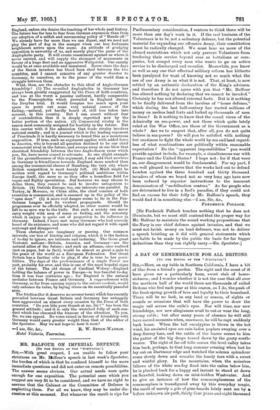MR. BALFOUR ON IMPERIAL DEFENCE.
[TO THE EDITOR OF THE " SPECTATOR."'
Sla,—With great respect, I am unable to follow your strictures on Mr. 1RP1four's speech in last week's Spectator, the burden of which is that be confined himself to the more immediate questions and did not enter on remote possibilities. The answer seems obvious. Our actual needs were quite enough for one exposition. The potential ones which you suggest are very fit to be considered, and we have no right to assume that the Cabinet or the Committee of Defence is neglecting them. For all we know, they may be under dis- cussion at this moment But whenever the result is ripe for Parliamentary consideration, I venture to think there will be more than one day's work in it. If the real business of the Volunteers is to be, not a sedentary defence, but the potential material for expanding our offensive Army, their constitution must be radically changed. We must hear no more of the absurd restrictions which not only prevent Volunteers from tendering their service beyond seas as battalions or com- panies, but compel every man who wants to go on active service to be discharged and re-enlist. Meanwhile, you know as well as any one that effectual military reform has hitherto been paralysed for want of knowing not so much what the use of our Army is as what it is not. That, at least, is now settled by an authentic declaration of the King's advisers, and therefore I do not agree with you that "Mr. Balfour has altered nothing by declaring that we cannot be invaded." Certainly he has not altered external facts. But is it nothing to be finally delivered from the incubus of "home defence," which during the last half-century has wasted millions of money on useless land forts and locked up thousands of men in them P Is it nothing to know that the sound views of the Admiralty on sea-power, and not those which quite lately ruled at the War Office, are those of the Government as a whole P Axe we to suspect that, after all, you do not quite believe in sea-power ? Or will you be satisfied with nothing but readiness to fight the whole world by sea and land regard- less of what combinations are politically within reasonable expectation ? Do the "apparent impossibilities" you would provide against include, for example, a simultaneous war with France and the United States ? I hope not : for if that were so, our disagreement would be fundamental. For my part, I am well pleased to observe that the works laid out to defend London against the three hundred and thirty thousand invaders of whom we heard not so very long ago have now been reduced by superior instructions to the innocent denomination of "mobilisation centres." As for people who are determined to live in a fool's paradise, if they could not find an excuse for their folly in Mr. Balfour's speech, they would find it in something else.—I am, Sir, &c.,
FREDERICK POLLOCK.
[Sir Frederick Pollock touches nothing that he does not illuminate, but we must still contend that the proper way for Mr. Balfour to maintain the sound working propositions that the Navy is our chief defence against invasion, and that we must not lavish money on land defences, was not to deliver a speech bristling as it did with general statements which are liable to be made by the public the basis for far bigger deductions than they can rightly carry.—En. Spectator.]






































 Previous page
Previous page